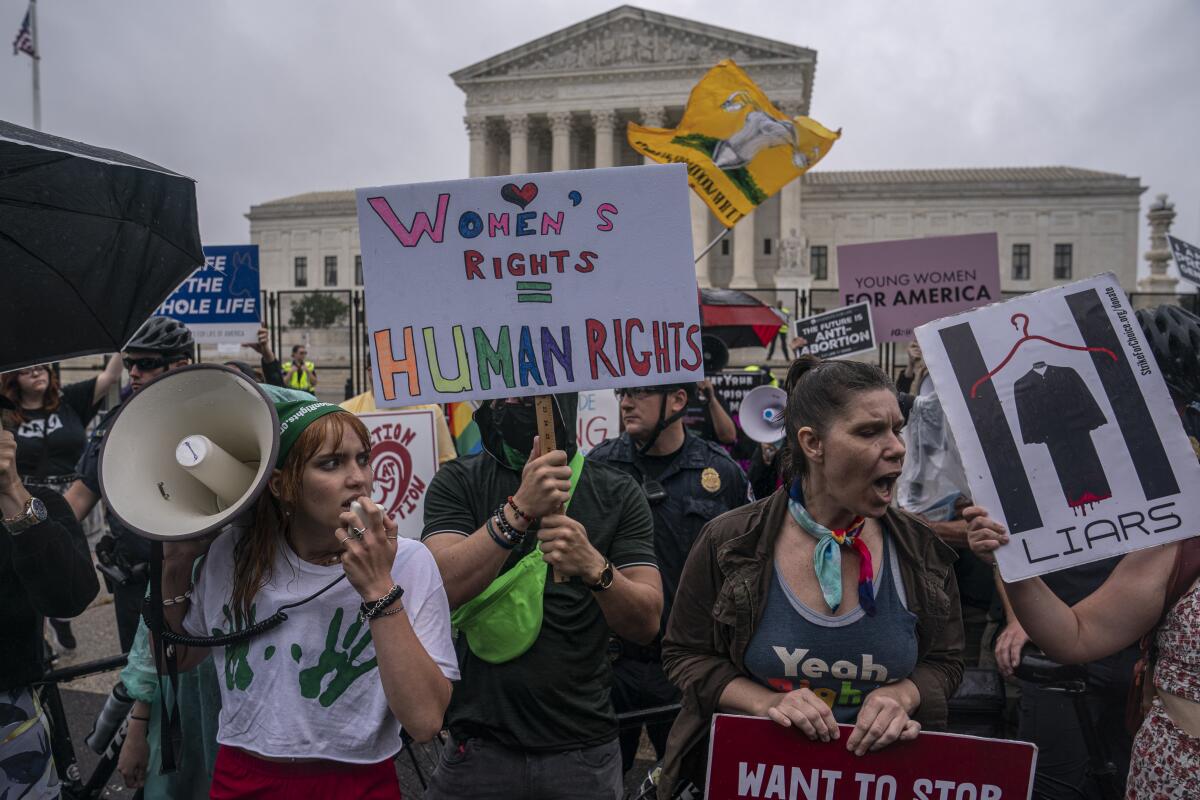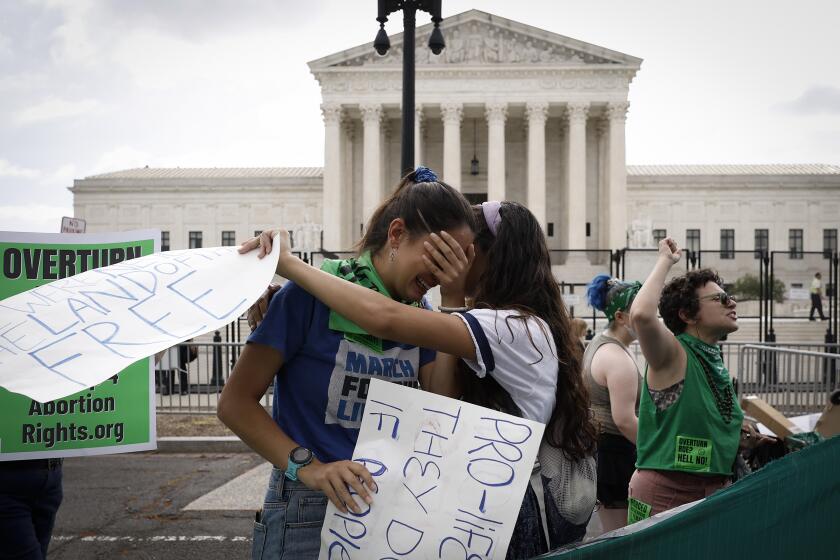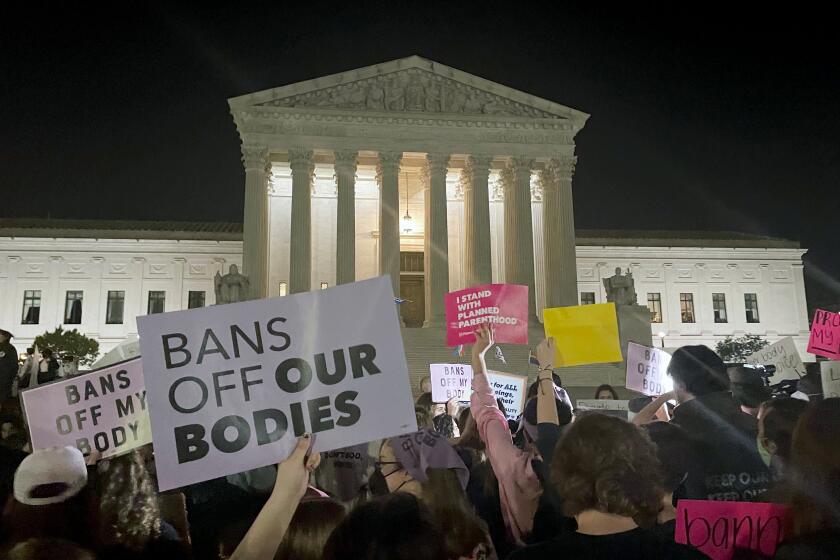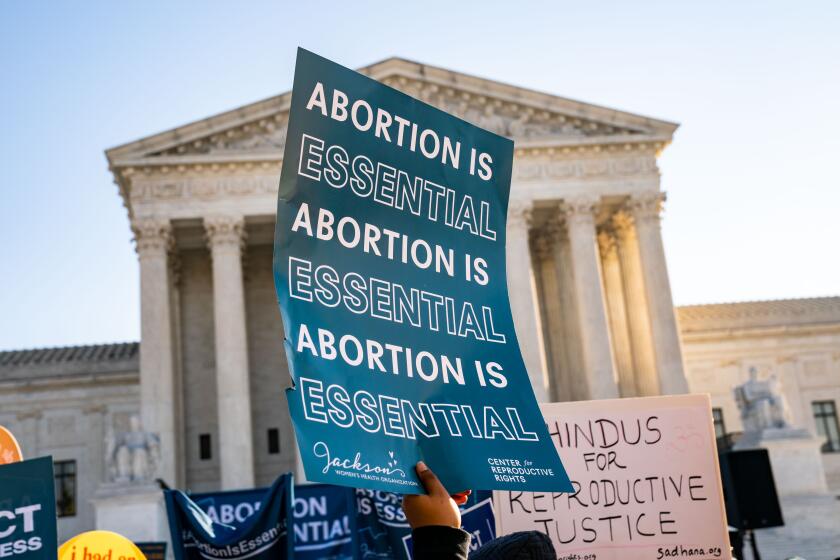Editorial: Roe has been overturned. Feel outraged, feel betrayed — then fight to get it back

- Share via
In a dreaded and once-unfathomable decision, the Supreme Court on Friday overturned Roe vs. Wade. It’s a dark time in America as this once-revered institution has taken the rare and awful path of depriving people of their rights.
With its 5-4 decision the court abolished the constitutional right to an abortion up to the point of viability of the fetus outside the womb, forcing the nation back 50 years to a time when state legislators decided whether to allow pregnant women control over their bodies.
Or maybe the court has taken us back even further in time. Part of the justification for overturning Roe was because centuries of history indicate abortion was criminalized. “When the majority says that we must read our foundational charter as viewed at the time of ratification (except that we may also check it against the Dark Ages), it consigns women to second-class citizenship,” the three dissenting justices wrote.
In a historic reversal, the Supreme Court strikes down a half-century of nationwide abortion rights in the U.S.
The decision was not a surprise, because a draft had been leaked earlier this year. But it’s devastating nonetheless that the Supreme Court has chosen to take away a constitutional right. The repercussions will be quick and severe: 13 states have trigger laws and others have pre-Roe bans still on the books. In Arkansas, Missouri, Kentucky, Louisiana and Mississippi — the state that brought the case that led to the ruling Friday — the ban will go into effect within hours of Roe being overturned.
Even if we don’t return to the time of back-alley abortions, what’s ahead is uncertainty. For those living in states that outlaw or severely restrict the procedure, getting an abortion will now involve traveling hundreds of miles out of state to find care — with all the attendant costs — or obtaining medical abortion pills. But obtaining the drugs through the mail might be considered a crime under these state laws and subject to prosecution. Some states are considering how to ban the pills.
As always, abortion restrictions fall heaviest on those who already have trouble accessing healthcare — people of color, people in rural areas, disabled people and those with low incomes who have less ability to pay for the procedure as well as arrange for child care and time off from work while they go to another state for abortion care.
The post-Roe world is likely to be confusing and legally chaotic for people seeking an abortion.
This is not a simple matter of returning a controversial issue to the states to decide, as Justice Samuel A. Alito Jr. makes it sound in his opinion. The Supreme Court is depriving people of the right to control their own bodies and allowing state politics to determine the existence of a fundamental liberty.
Roe vs. Wade guaranteed the right to choose a path — to either end or continue a pregnancy. It is incalculable how much that freedom, that opportunity, that choice to control one’s body shapes a person’s life. And everyone, not just those who can get pregnant, should be outraged that the court would do more to ensure that people can carry a concealed gun in public than defend the right of Americans to make personal reproductive decisions.
The three liberal justices who dissented in this decision — Stephen G. Breyer, Sonia Sotomayor and Elena Kagan — ended their opinion with this heartbreaking coda: “With sorrow — for this Court, but more, for the many millions of American women who have today lost a fundamental constitutional protection — we dissent.”
So be angry about what the court did. Feel betrayed that Brett M. Kavanaugh, Neil M. Gorsuch and Amy Coney Barrett all said during their Senate confirmation hearings that Roe was a precedent, which many took to mean they wouldn’t seek to overturn it.
The conservatives on the court have forced this nation back to an age that most Americans don’t remember well, if at all. The work now falls on this generation to restore the right to abortion and personal freedom.
What abortion rights advocates are doing — and what everyone should be focused on — is how to make abortion accessible across the nation in a post-Roe world. Dozens of organizations across the country are raising moneyto help needy people without means to travel for an abortion.
Roe vs. Wade may be overturned by the Supreme Court. If senators care about the rights of half of the people in the U.S., they must vote for the Women’s Health Protection Act.
A number of states have introduced motions to enshrine the right to abortion in their constitutions. California is one of them. Legislators here have also introduced bills to help fund abortions and thwart other states’ efforts to criminalize any of their residents when they seek abortions in this state.
The Biden administration is exploring options to help women get abortions as well — including declaring a public health emergency, which might protect doctors in states that allow abortion when they provide the procedure to people from states that don’t allow it. The Food and Drug Administration already allows abortion pills to be shipped to a person after a telehealth consultation. There is a move afoot to get the Food and Drug Administration to declare that its federal authorization of the use and shipment of the drugs nationwide overrides any state trying to ban the sale or receipt of them. Sadly, the Women’s Health Protection Act, a federal bill that would ensure the right to an abortion, was voted down in the Senate recently.
This is just the beginning of a battle over reproductive rights in America, and possibly for other rights as well. In his concurring opinion, Justice Clarence Thomas wrote that the court should reconsider landmark decisions on contraception, sodomy laws and same-sex marriage. If that seems unthinkable, consider how unlikely it seemed even a year ago that Roe vs. Wade would fall.
Dark times, indeed.
More to Read
A cure for the common opinion
Get thought-provoking perspectives with our weekly newsletter.
You may occasionally receive promotional content from the Los Angeles Times.













